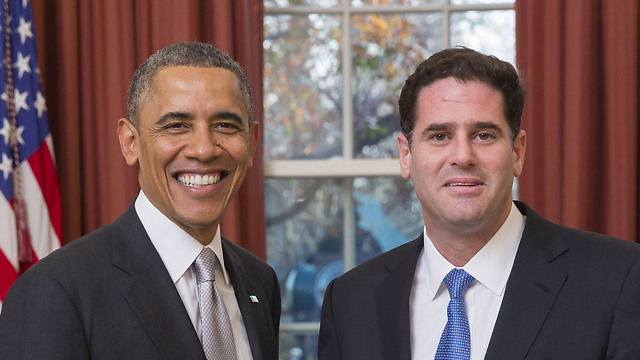
Expect US backlash from Netanyahu's Congress speech, experts warn
From stalled weapons deliveries and military aid, to silently allowing the EU to sanction Israel for settlements, the fallout from Netanyahu's speech could be severe.
Prime Minister Benjamin Netanyahu's March 3 speech to Congress - opposed by the White House and many Democrats - has Israel in uproar amid fears it will deal a serious blow to Israel's ties with the US.
Two experts on US-Israel believe there will be ramifications for Israel, in light of the fact that it appears that Israeli officials colluded with Republicans to conceal the invitation from the White House and some of the staunchest of Israel supporters have called on Netanyahu to change his mind about the speech.

Prof. Eytan Gilboa, an expert on American Mideast policy and US-Israel ties, and Danny Halperin, Israel's former economic attaché in Washington both warn that there will be a response, albeit undeclared.
"Relations between Obama and Netanyahu have deteriorated once again," says Gilboa. "There is a schism in the Democratic party and the Jewish community is embarrassed."
According to Gilboa, the American pro-Israel lobby could be the first casualty in this latest row. "With all the power (the lobby) had up until now, its ability to function has been damaged," he says.
But, says Gilboa, the person to pay the biggest personal price for the incident will be Israeli Ambassador to the US Ron Dermer, a close confidant of Netanyahu who met with John Kerry 48 hours before the news of Netanyahu's visit broke, and failed to tell him that House Speaker John Boehner had extended the invitation to the prime minister.
"The White House, and thus the State Department, have marked him with a big X. An ambassador without access to the White House or the State Department cannot do his job," says Gilboa.
While he rejects the possibility of irreversible long-term damage, Gilboa believes, like many others, that Netanyahu should forego his Congress appearance.
"One alternative is to go to Washington and make do only with an address at the AIPAC conference and personal meetings with Congressional leaders – an option that Jewish delegates proposed to Dermer and Knesset Speaker Yuli Edelstein last week," Gilboa says.

"Another alternative is for Netanyahu to take Isaac Herzog with him, and thus defuse all the implications and allegations concerning an internal Israeli political maneuver, an election ploy. A third alternative is to postpone the address and visit until after the elections.
"The negotiations with Iran have very little chance of yielding an agreement by the end of March; and in any event, Congress has already decided that it will discuss and make a decision on the issue of more severe sanctions against Iran only just before March. Netanyahu could deliver his address two days after the election and thus come down from his high horse and more readily achieve the result he is looking for."
Gilboa believes that Obama and Netanyahu lack the ability to communicate or work together. "A different prime minister and a different American president, and the picture would be a different one too," he says. "If Netanyahu is re-elected, Obama has another two more years in power and this could spell serious problems."
Another problem is the American stance on the Israeli-Palestinian conflict and the Palestinian Authority's desire to drag Israel through the International Court of Justice. America's veto power at the UN Security Council has often prevented unpleasantness for Israel, but this, too, is now at risk.
"If this crisis continues, the United States could refrain from using its veto. Our political situation is difficult enough as it is, and without US support, it would become untenable," Gilboa notes.
When it comes to the veto, according to Halperin, Congress could enact legislation that would hamper cooperation with the UN, but the president is the one who makes the decision on the veto itself in the Security Council. The Europeans' attitude towards Israel is another problem.
"European countries are less friendly towards Israel," Halperin says. "The moment the US tells the Europeans that they can pressure Israel, our situation will become a lot more difficult."
Security ties: $3 billion at stake
Most Israeli developments in the field of defense are financed by the US – to the tune of more than $3 billion a year. According to Gilboa, there have been instances in the past when Washington has suspended the supply of arms, delayed procurement talks and reduced strategic and intelligence cooperation.
"These will be the consequences if Netanyahu is re-elected for another term in office," he says. "If the crisis continues, it could lead to a reduction in the aid or its delay. A large portion of the Iron Dome and Arrow missile systems are US-funded. The F-35 fighter planes we are set to purchase – one piece costs around $150 million."
In principle, Halperin notes, Congress determines the aid package to Israel and the administration cannot actually touch it, even if relations are strained. However, he adds, the Obama administration does have ways and means to undermine the aid.
"If the administration is hostile towards Israel, it's no problem to say order X or order Y from a certain industry doesn't meet specific criteria, and Congress can't intervene," Halperin says.
"The defense aid is spent on procurement," Halperin adds. "The administration can always provide excuses for not supplying something that Israel wants even though the money is available. The administration, if it so desires, can always put a spoke in the wheel."
Economic ties: The risk of sanctions
Gilboa foresees more European pressure on Israel, both economic and political, in an effort to get Jerusalem to conduct talks with the Palestinians in keeping with European perceptions.
"There's an entire movement of boycotts against Israel in Europe. Israel's international standing and strength depend on American support. A fall-off in support means a fall-off in Israeli capabilities. This would make things easier for anyone who wants to harm Israel."
Halperin notes that while the US administration may not be involved in day-to-day economic matters, it does play a part when it comes to Israeli companies seeking to purchase American ones.
"The US has an inter-ministerial body that needs to approve such purchases. Such a body could suddenly adopt a harder or softer line," he warns.
In the very long term, Halperin adds, Israel's economy could be affected by a deterioration in the relations between Israel and the United States. In the shorter term, it could happen tomorrow.
"If Europe adopts a harder line against Israel, and it could happen for numerous reasons, it will clearly have an effect on the Israeli economy," he says. "We live in a global world; and as a country that is dependent on its foreign trade, if there is an unfriendly attitude towards Israel, not in the United States but in Europe, it will clearly affect the Israeli economy too."
And how will we, the citizens, feel the effect? Well, the hi-tech industry is likely to take the brunt of the blow – and that could easily pave the way to a recession.
"It's not something that is going to happen overnight, but it's a process that once started could lead to a very slippery slope," Gilboa says.
"I hear from businessmen who are witnessing the first signs of reservations and evasive tactics. It's already happening and it will get a lot worse if the United States reduces its support for Israel. The citizens will feel it in terms of the loss of jobs."










